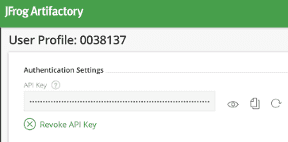Using the JFrog Artifactory CLI with API Keys or Access Tokens
I received early adopter access to our JFrog Artifactory instances located at https://redacted.jfrog.io. After you log in via SSO you are redirected to https://redacted.jfrog.io/redacted/webapp/#/home (note that /redacted/ path segment as this is needed for API URLs). I wanted to try CLI access so I started with a simple unauthenticated ”ping” using curl against the REST API using -s for “silent mode” and -i to include HTTP response header is output, but limit to the first line by piping through head.
$ curl -s -i https://redacted.jfrog.io/redacted/api/system/ping | head -n 1
HTTP/1.1 200 OKSuccess. Let’s try some negative testing of my user but with an invalid API key.
$ curl -s -i -u "0038137:INVALID_APIKEY" \
https://redacted.jfrog.io/redacted/api/system/ping | head -n 1
HTTP/1.1 401 UnauthorizedNow let’s grab my API key and try again.
$ curl -s -i -u "0038137:REDACTED_APIKEY" \
https://redacted.jfrog.io/redacted/api/system/ping | head -n 1
HTTP/1.1 200 OKNotice that I’ve replaced my real API Key with REDACTED_APIKEY above. Using the real API Key works, but it is long, hard to type, and using it that way exposes it to someone looking in my .bash_history file.
Let’s switch to using the JFrog CLI and see how that works with my API Key. Visit the documentation site for full install instructions, including auto-completion scripts. This CLI works with multiple JFrog products, and rt is the target argument for JFrog Artifactory. The config command will create a ~/.jfrog/jfrog-cli.conf file that is used for other CLI commands. For the command history reason above, I recommend not to use the --apikey parameter and enter your API Key in interactive mode.
$ jfrog --version
jfrog version 1.27.0
$ jfrog rt config --url https://redacted.jfrog.io/redacted/ --user 0038137
Artifactory server ID: redacted
Access token (Leave blank for username and password/API key):
Password/API key:
[Info] Encrypting password...Similar to the REST API, the JFrog CLI supports a ping command to verify that Artifactory is accessible.
$ jfrog rt ping
OKTaking a peek at the config file, you can see the API Key was stored in the “password” field during the interactive flow.
$ cat ~/.jfrog/jfrog-cli.conf
{
"artifactory": [
{
"url": "https://redacted.jfrog.io/redacted/",
"user": "0038137",
"password": "REDACTED_APIKEY",
"serverId": "redacted",
"isDefault": true
}
],
"Version": "1"
}There is also a Running cUrl feature to invoke REST APIs not available in the JFrog CLI. That takes the same arguments as native curl but uses a shortened REST API path and automatically includes login credentials.
$ jfrog rt curl -X GET /api/system/ping
OKIf you really love complicated command lines, you could inject your API Key from the config file using jq and still execute curl yourself. Have fun!
$ jq -r ".artifactory[0].password" ~/.jfrog/jfrog-cli.conf
REDACTED_APIKEY
$ curl -s -i \
-u "0038137:$(jq -r ".artifactory[0].password" ~/.jfrog/jfrog-cli.conf)" \
https://redacted.jfrog.io/redacted/api/system/ping | head -n 1
HTTP/1.1 200 OKNow let’s trying something that is unique to my user by calling the REST API to Get API Key. This should echo back the same REDACTED_APIKEY I have in my config file.
$ jfrog rt curl -X GET /api/security/apiKey
{"apiKey":"REDACTED_APIKEY"}For my CI/CD pipelines, I don’t really want my personal API Key being used. Luckily, JFrog also supports Access Tokens “as a flexible means of authentication with a wide range of capabilities” including:
- User and non-user authentication
The case for authenticating users is clear, however access tokens can also be assigned to non-user entities such as CI server jobs.
- Flexible scope
By assigning Groups to tokens, you can control the level of access they provide.
Let’s create an access token that is valid for the next 90 seconds and then configure a REDACTED_ID entry in our config file.
$ jfrog rt curl -X POST /api/security/token \
-d "username=0038137" \
-d "scope=member-of-groups:readers" \
-d "expires_in=90"
{
"scope" : "member-of-groups:readers api:*",
"access_token" : "REDACTED_TOKEN",
"expires_in" : 90,
"token_type" : "Bearer"
}
$ jfrog rt config --url https://redacted.jfrog.io/redacted/ --user 0038137
Artifactory server ID [redacted]: REDACTED_ID
Access token (Leave blank for username and password/API key): Quickly use the token with a ping command specifying the REDACTED_ID config, then wait for 90 seconds for the token to expire and execute another ping command.
$ jfrog rt ping --server-id REDACTED_ID
OK
$ echo "wait 90 seconds"
wait 90 seconds
$ jfrog rt ping --server-id REDACTED_ID
[Error] Artifactory response: 401 Unauthorized
{
"errors": [
{
"status": 401,
"message": "Token failed verification: expired"
}
]
}When you inspect the JWT payload data from that token, you can see the exp time.
{
"sub": "jfrt@01dc27m2makwbg11a8k5sr05z2/users/0038137",
"scp": "member-of-groups:readers api:*",
"aud": "jfrt@01dc27m2makwbg11a8k5sr05z2",
"iss": "jfrt@01dc27m2makwbg11a8k5sr05z2",
"exp": 1566405855,
"iat": 1566405765,
"jti": "47e178d6-0263-4c13-969c-087f79a07a02"
}Unfortunately, this still is an Access Token tied to my user account. There is a way for Admin Users to create Access Token for “non-user entities such as CI server jobs” (mentioned above), so I need to work with our JFrog Artifactory admin to figure out the best way to move forward.
